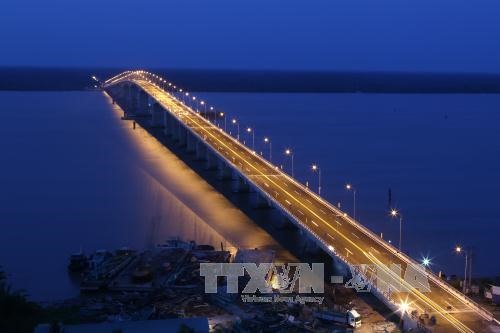 Society
Society

The Mekong Delta should strengthen links between the transport infrastructure in its 12 provinces and Cần Thơ city to further foster development, Minister of Transport Nguyễn Văn Thể has said.
 |
| Cổ Chiên Bridge that links Bến Tre and Trà Vinh provinces in the Mekong Delta. — VNA/VNS Photo Duy Khương |
SÓC TRĂNG — The Mekong Delta should strengthen links between the transport infrastructure in its 12 provinces and Cần Thơ City to further foster development, Minister of Transport Nguyễn Văn Thể has said.
Speaking at a seminar held in Sóc Trăng Province on Thursday, he said the delta should exploit its marine and inland waterway advantages to develop transportation since funding is limited.
In 2018-20, his ministry would build roads and other transport infrastructure to improve intra-regional links and ease congestion on roads, he said.
They include construction of the Mỹ Thuận-Cần Thơ Expressway and Road No 2 linking Long An, Đồng Tháp and Kiên Giang provinces; an upgrade to National Highway No 60 section between the Rạch Miễu to Cổ Chiên bridges, the Chợ Gạo Canal No 2, and the Cần Thơ international airport; and construction of Trần Đề Port.
At the seminar, the ministry presented details of the port to gather opinions before submitting it to the Prime Minister by the end of this year.
The 5,000ha port in Sóc Trăng Province’s Trần Đề District, which would help the delta directly export and import goods when it is built, is designed to berth container vessels weighing up to 100,000 tonnes.
It will cost VNĐ40 trillion (US$1.7 billion), which will come from private investors.
“If the delta can have a deep-water seaport, its economy will achieve a breakthrough in development,” Thể said.
The region has great potential and many advantages but its income per capita is low and is developing slower than other parts of the country, he said.
Sóc Trăng Province is the most favourable location for the construction of the deep-water port because it is near Cần Thơ City and has a road network connecting it with the delta’s other provinces.
Nguyễn Văn Tuấn, vice chairman of the Hậu Giang Province People’s Committee, said the construction of the port is essential and would serve the entire delta.
The delta, the country’s largest producer of rice, fruits and seafood, has four means of transport – roads, inland waterways, sea and air.
Waterways carry 70 per cent of the goods transported and roads account for the remaining 30 per cent, according to the ministry.
Some 131.7 million tonnes of goods were transported in the delta last year after growing at 6.2 per cent a year in the 2010-17 period.
Participants at the seminar agreed to solicit investment in Trần Đề Port.
The delta has seven seaports but they only handle 20-25 per cent of the goods transported by sea since none of them can handle vessels of more than 20,000DWT.
Cái Cui Seaport in Cần Thơ, the largest, can accommodate vessels weighing more than 20,000DWT but such vessels have no access to it because of the limited capacity of the Hậu River passage leading to it.
As a result, much of the delta’s foreign trade has to be conducted through seaports in the south-eastern region, according to Lê Đỗ Mười, deputy head of the ministry’s Transport Strategy and Development Institute.
The delta provinces and Cần Thơ City petitioned the ministry to continue investing in certain roads in the region like the National Highway No 54 section in Vĩnh Long Province and the National Highway No 91 section in Cần Thơ.
They also urged it to complete on schedule major transport works like the Vàm Cống Bridge, the Trung Lương-Mỹ Thuận and Mỹ Thuận-Cần Thơ expressways, the Rạch Miễu Bridge No 2, and the Mỹ Thuận Bridge No 2.
The delta has a population of around 19 million. — VNS




